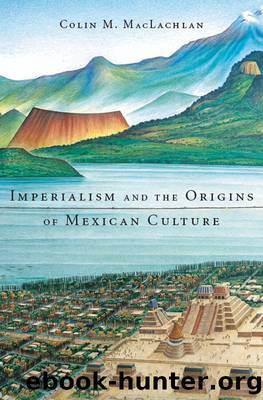Imperialism and the Origins of Mexican Culture by Colin M. MacLachlan

Author:Colin M. MacLachlan [MacLachlan, Colin M.]
Language: eng
Format: epub
Tags: Nonfiction, History, Americas, Mexico, Spain & Portugal, Social & Cultural Studies, Political Science
ISBN: 9780674286436
Publisher: Harvard University Press
Published: 2015-04-13T04:00:00+00:00
1492 in the European Context
On the Iberian Peninsula by the middle of the century, Castile could look forward to victory over the Moors: the Christians may not have an easy time of it, but the trend favored them and appeared irreversible. In the wider Mediterranean world, one could not be so sanguine. The decade of the 1450s appeared to represent an acceleration of the biblical clock. That year, Mahomet II succeeded his father as the Ottoman sultan. The Turks conquered much of the Balkans, as the aptly named terror of Europe squeezed the remnants of Romeâs eastern empire, and in 1453, the unthinkable occurred as Constantinople fell into Ottoman hands. The shock stunned the Christian world, which viewed the bastion city as able to withstand any siege. Aeneas Silvus Piccolomini (Pope Pius II) viewed the calamity as the âsecond death of Homer and a second destruction of Plato.â The humanists worried that western Europe would be thrown back into the dark ages.25 The westward advance of Islam caused near panicâwhether Rome would be next became a question, if not as yet a certainty. In the face of the threat, Pope Pius II (1458â1464) in 1461 proposed what amounted to a policy option to consider the religious inclusion of Mahomet II. As a lure, the pope suggested that such a conversion would make Mahomet the greatest man of his time as well as the emperor of the Greeks and the east. Pius went on to list the things that Islam and Christianity had in common, mainly one God, agreement on the centrality of faith, an afterlife of reward or punishment, immortality of the soul, and the acceptance of the Old and New Testaments. With more than a touch of desperation, Pius appealed to reason in support of his view that the prohibition of theological discussion under Muslim law itself violated reason.26 What is interesting here is the idea that a fusion and creation of an OttomanâEastern Orthodox rite might be possible (at least in the mind of Pope Pius). It is not clear that the letter formally reached the sultan, although Ottoman spies might have reported its existence. Mahomet II in any case would have had little reason to entertain the idea as the victorious onslaught continued.
The unraveling of security and the realization that most of the world to the east posed a danger to Christianity made a seaborne escape into the Atlantic crucial as a way of circumventing the psychological and actual Muslim barrier that followed the fall of eastern Christendom. The Portuguese led the way as they inched down the coast of Africa hoping to break the Arab monopoly on the spice trade by a daring run around blocked land routes. Their plan included making contact with a semimythical Prester John, reputed to be the monarch of an isolated Christian kingdom somewhere in eastern Africa. Rumors of the existence of the Coptic kingdom filtered through Muslim sources. Columbusâs idea of sailing west to India fitted in with the grand scheme.
Download
This site does not store any files on its server. We only index and link to content provided by other sites. Please contact the content providers to delete copyright contents if any and email us, we'll remove relevant links or contents immediately.
| Africa | Americas |
| Arctic & Antarctica | Asia |
| Australia & Oceania | Europe |
| Middle East | Russia |
| United States | World |
| Ancient Civilizations | Military |
| Historical Study & Educational Resources |
Machine Learning at Scale with H2O by Gregory Keys | David Whiting(4313)
Never by Ken Follett(3957)
Fairy Tale by Stephen King(3399)
Oathbringer (The Stormlight Archive, Book 3) by Brandon Sanderson(3214)
The Man Who Died Twice by Richard Osman(3080)
Will by Will Smith(2920)
Rationality by Steven Pinker(2365)
Can't Hurt Me: Master Your Mind and Defy the Odds - Clean Edition by David Goggins(2341)
The Dark Hours by Michael Connelly(2308)
Friends, Lovers, and the Big Terrible Thing by Matthew Perry(2230)
The Dawn of Everything: A New History of Humanity by David Graeber & David Wengrow(2210)
Principles for Dealing With the Changing World Order: Why Nations Succeed and Fail by Ray Dalio(2055)
A Short History of War by Jeremy Black(1848)
HBR's 10 Must Reads 2022 by Harvard Business Review(1844)
Go Tell the Bees That I Am Gone by Diana Gabaldon(1758)
A Game of Thrones (The Illustrated Edition) by George R. R. Martin(1745)
Kingdom of Ash by Maas Sarah J(1681)
515945210 by Unknown(1667)
443319537 by Unknown(1559)
